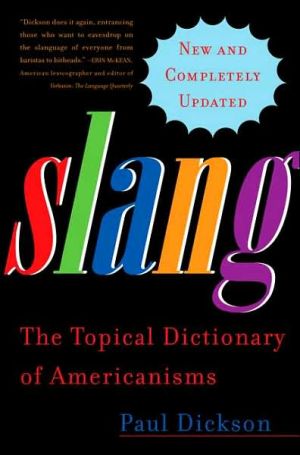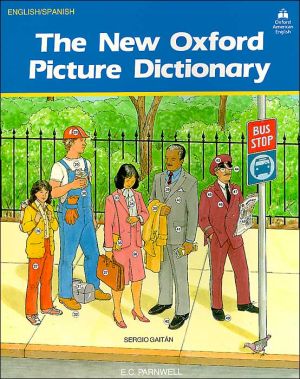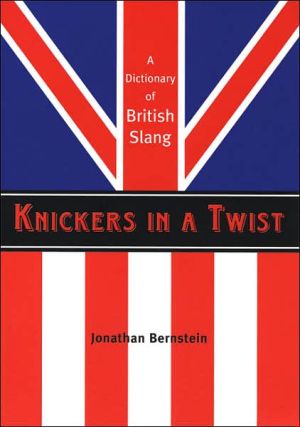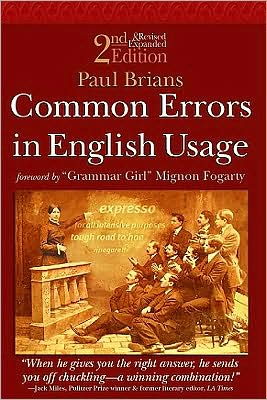Slang: The Topical Dictionary of Americanisms
Slang is evidence that the spoken language is continually changing to meet new needs for verbal expressions, tailored to changing realities and perceptions. Unlike most slang dictionaries that list entries alphabetically, Slang takes on modern American English one topic at a time, from "auctionese" to "computerese", the drug trade and sports slang. Slang was originally published by Pocket Books in 1990 in paperback (ISBN 0671672517, out of print) and revised in 1998 in hardcover and paperback...
Search in google:
Slang is evidence that the spoken language is continually changing to meet new needs for verbal expressions, tailored to changing realities and perceptions. Unlike most slang dictionaries that list entries alphabetically, Slang takes on modern American English one topic at a time, from "auctionese" to "computerese", the drug trade and sports slang. Slang was originally published by Pocket Books in 1990 in paperback (ISBN 0671672517, out of print) and revised in 1998 in hardcover and paperback (ISBN 0671549200 and 0671549197; hc out of print soon after publication, pb in print until 2005). The new Slang has 50% new material, including new chapters on slang associated with work cubicles, gaming, hip hop, and coffeehouses. Dickson brings slang into the twenty-first century with such blogger slang as TMPMITW, which stands for "the most powerful man in the world" (the president). Whether you want to be privy to the inside banter of the boardroom, backroom or the Washington Beltway, Slang is an indispensable resource, and a lot of fun. Library Journal Dickson is the author of numerous well-received one-man lexical works written in a very accessible style, among them War Slang and The Congress Dictionary. His third edition of Slang both an update and a revision of the earlier editions (1990 and 1998) includes 30 topics, such as "Bureaucratese" and "Real Estate," and more than 10,000 words. Some topics from earlier editions have been dropped (e.g., "Pentagonese," "Countercultural Slang"), others have undergone minor title changes, while nine are new topics altogether (e.g., "Hip-hop," "Net-speak"). The topical arrangement is unique among dictionaries of American slang, and the published edition will include an index (which wasn't included in the advanced reading copy seen by this reviewer). Bottom Line Dickson does a better job here of providing the sources he used to compile the entries in his own book, and he gives more information on origins than in previous editions, but this is neither an etymological dictionary nor the sort of cultural commentary one finds in books like Leslie Savan's Slam Dunks and No-Brainers (Knopf, 2005). Jonathan Green's Dictionary of Contemporary Slang (Macmillan, 1984) also tries to catch the current scene, but it is now more than 20 years old, which is ancient so far as slang is concerned. Dickson's is a useful addition to any reference collection and will complement rather than replace his earlier editions. Peter Dollard, Mt. Pleasant, MI Copyright 2006 Reed Business Information.
\ Library JournalDickson is the author of numerous well-received one-man lexical works written in a very accessible style, among them War Slang and The Congress Dictionary. His third edition of Slang both an update and a revision of the earlier editions (1990 and 1998) includes 30 topics, such as "Bureaucratese" and "Real Estate," and more than 10,000 words. Some topics from earlier editions have been dropped (e.g., "Pentagonese," "Countercultural Slang"), others have undergone minor title changes, while nine are new topics altogether (e.g., "Hip-hop," "Net-speak"). The topical arrangement is unique among dictionaries of American slang, and the published edition will include an index (which wasn't included in the advanced reading copy seen by this reviewer). Bottom Line Dickson does a better job here of providing the sources he used to compile the entries in his own book, and he gives more information on origins than in previous editions, but this is neither an etymological dictionary nor the sort of cultural commentary one finds in books like Leslie Savan's Slam Dunks and No-Brainers (Knopf, 2005). Jonathan Green's Dictionary of Contemporary Slang (Macmillan, 1984) also tries to catch the current scene, but it is now more than 20 years old, which is ancient so far as slang is concerned. Dickson's is a useful addition to any reference collection and will complement rather than replace his earlier editions. Peter Dollard, Mt. Pleasant, MI Copyright 2006 Reed Business Information.\ \








